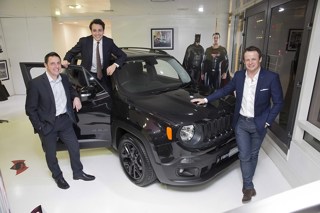The role of the car dealership’s business manager is evolving – and digitalisation is playing its part in that change.
However, even with the onset of digital and online finance agreements together with the arrival of the agency model in the franchised sector, the often clunky, clumsy and complex nature of arranging funding means human intervention remains inevitable.
Straightforward end-to-end online car purchase deals where the customer has little or no interaction with the dealer until collection or delivery are rare.
Online finance applications often accelerate the process and provide customers and dealers with an indication of price and acceptance, but it doesn’t take long for complications to create stumbling blocks which usually result in the deals being taken offline.
Indeed, online quoting and eligibility checking has already taken a level of work away from the dealer. However, complications can arise with declined and conditionally-approved applications as well as anything which could alter the finance offer.
From cherished plates to negative equity and seemingly simple issues such as a change in the part-exchange price or obtaining the settlement figure for a customer’s current vehicle, are all highly likely to move the application from online to offline. Plus, there’s the add-on products to be sold.
Meanwhile, the agency model raises a host of questions over new car funding, including who is responsible for selling the finance and when and how add-on products are offered.
Currently 35% of transactions managed by the iVendi system are self-served and that figure is expected to grow to 45% this year.
Things can 'get messy'
However, there’s still a requirement for human interaction when the finance agreement needs to be revised, requiring the customer to be kept informed and engaged.
 CEO James Tew says: “Technology makes the process quicker, slicker, easier and more transparent. But there’s plenty of things that can get messy in car finance.”
CEO James Tew says: “Technology makes the process quicker, slicker, easier and more transparent. But there’s plenty of things that can get messy in car finance.”
Consequently, iVendi has introduced its ‘concierge’ approach whereby a professional liaises with the customer, makes the necessary amendments to the deal including giving explanations, before returning it to the digital space where the customer can complete the application in their own time.
Tew adds: “If it’s a case of ‘we need another £1,000 deposit’ or ‘it’s 48 months, not 60’, I think there should be human intervention. I actually believe it would be cheaper and more cost-effective to use people than technology because it’s about human interaction.”
As well as offering a choice of lenders in the online space, Tew advises when a decline occurs a person should step in and target the lender most likely to approve
rather than undertake several credit searches on the person.
Tew adds: “The amount of revenue that can be generated by people involvement is significant. Technology will do a good level of it, but it can’t do it all.
“What human beings are really good at is smoothing the cracks and I think that’s very much what we do in easing these pain points in the digital journey.”
Dealers utilising the ‘concierge’ approach are also boosting online sales of add-ons.
The company is working with some dealers which offer 70% of its customers add-on products - those who have been spoken to and expressed an interest, and are seeing a 30% penetration compared with those dealers targeting all its vehicle buyers and upselling 24% of its deals.
Tew believes centralising add-on sales is attractive for larger dealers as it delivers cost savings and makes managing a team much more straightforward.
Realtime Communications (RTC) helps motor retailers to optimise customer lifetime value including evolving the business manager role from the traditional maximising F&I income to enhancing the customer’s lifetime experience and ownership journey.
 Commercial director Alistair Jeff says: “Placing customer needs at the heart of a dealer’s culture, as expected by the Financial Conduct Authority (FCA), is an opportunity to redefine the BM function. We believe that pivoting the traditional title can be a step in the right direction.”
Commercial director Alistair Jeff says: “Placing customer needs at the heart of a dealer’s culture, as expected by the Financial Conduct Authority (FCA), is an opportunity to redefine the BM function. We believe that pivoting the traditional title can be a step in the right direction.”
Value of personal service
Technology is already central to the agreement selection and process, providing a fast, transparent and compliant experience.
However, Jeff identifies an opportunity to broaden the ‘new BM role’ to support people needing extra assistance with finance and embrace the broader dealer proposition such as service plans, extended warranties, smart insurance, and other added-value features which can be joined by new services such as recharging EVs or valet services.
He says: “The role as we see it developing will be about servicing peoples’ car needs, saving them time and effort. Finance will be a core part of this dealership experience.
“Even in a digital age, personal service has a value and we should never forget that, for most people, ‘transportation costs’ are second only to housing. The new role of a BM can be about making ownership more manageable and more enjoyable.”
Likewise, online vehicle marketplace carwow’s commercial director Sepi Arani believes the business manager role will have to adapt rather than disappear altogether.
Arani says: “Ultimately, a broader knowledge base will be required to cover the existing forms of finance offering in the market, but also the ability to compare and contrast new additions such as subscription will be necessary.
 “With customers eagerly researching the best route to drive their chosen vehicle online and the growing forms offered by manufacturers – for a business manager to provide guidance and recommendations their knowledge will have to go above and beyond that of the savvy consumer.”
“With customers eagerly researching the best route to drive their chosen vehicle online and the growing forms offered by manufacturers – for a business manager to provide guidance and recommendations their knowledge will have to go above and beyond that of the savvy consumer.”
Technology will continue to develop including artificial intelligence (AI) such as chatbots that can easily answer generic questions and interactive FAQs (some of which brands already utilise well on their online journeys).
However, questions regarding F&I can often be granular and very specific to each consumer’s personal circumstance.
Arani says: “As such, a balance of both AI and human interaction will ultimately win for both consumers and brands alike.
Ensuring that basic questions are answered instantly without the need to draw on expensive human resources while offering a second line of real human interaction to keep consumers flowing through any online journey is critical to success.
“The brands that will succeed and delight the largest pool of customers are ones that offer consumers the choice and put them in the driving seat of how and when they want to progress in their purchase.
“Offering the ability to seamlessly connect online and offline journeys and to easily reference their ‘basket’ finance offering and ask questions to a human when required to are all key for retailers to offer their customers the perfect vehicle sales journey.”


















Login to comment
Comments
No comments have been made yet.